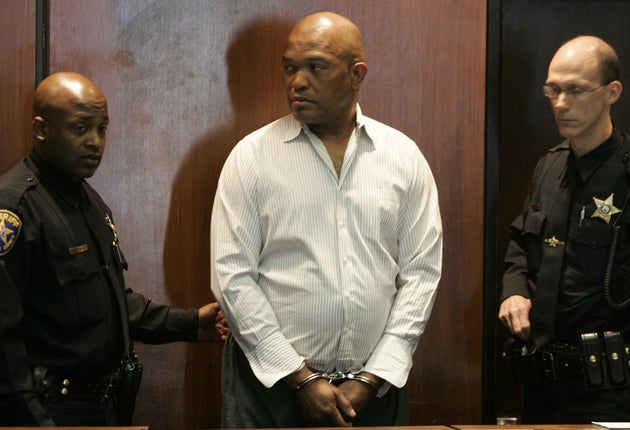Two in court over 30-year-old killings
Carpenter and his cousin accused of locking teenagers in house then burning it down

It has been one of America's most baffling, most haunting cold cases – of five teenagers last seen together on a sweltering summer afternoon almost 32 years ago, playing a game of pick-up basketball in a park. They each went home for supper, before going out again, to earn a few dollars helping a local carpenter with a job. Then they vanished from the face of the earth.
For decades, the fate of Randy Johnson, Michael McDowell, Melvin Pittman, Alvin Turner and Ernest Taylor, was a mystery. None of the boys, aged 16 and 17, had been in trouble with police in their home town of Newark, New Jersey, and their disappearance on August 20, 1978, was initially treated as a missing persons case.
According to one early theory, they might even have been among the 918 who died in the Jonestown mass suicide in Guyana three months later, but that proved a false lead. In 1986 and 1996, investigators called in psychics, who both times suggested the bodies were in garbage dumps near Newark International Airport. But searches turned up nothing. Some were convinced that handyman Lee Evans, aged 25, might be involved in the disappearance, but he passed lie detector tests.
But even in a tough working-class city like Newark, the case had a special resonance, and police never abandoned the case – and 18 months ago, the vital breakthrough came.
Mr Evans might have passed a polygraph test, but that counted for nothing when he became a born-again Christian. He appears to have gone to the brother of one of the boys, and told him he had to tell the truth. That truth, as presented by Newark prosecutors when they announced the arrest of Mr Evans and his cousin Philander Hampton this week, was more horrifying than almost anyone could imagine.
The boys are said to have stolen marijuana from one of the suspects. On that August 1978 evening, Mr Evans picked each of them up in his truck and took them to a deserted house where Mr Hampton and another suspect, who is now dead, were waiting to exact revenge.
One by one, the lawyer for the prosecution, Robert Laurino alleges, the boys were "corralled at gunpoint," before being bound and locked inside the house, which was then set on fire. The structure burnt to the ground. Today a smart three-storey house stands on the site. After being told what happened, police used ground-penetrating radar to locate the boys' remains. But nothing, not even teeth, turned up.
Today, Mr Evans, who is 56, and Mr Hampton, 53, say that no such killing took place. Yesterday, they made their first court appearance and pleaded not guilty, but will remain in prison on $5m bail, each charged on five counts of murder and arson.
Given the lack of bodies and other physical evidence, and the passage of time, the case may not be easy to prove. The last photos of the boys show them as school graduates, in caps and gowns. Even so the reaction of relatives yesterday was of relief, that part at least of the mystery had now been resolved. But not all of it. "They still haven't found the boys," Melvin Pittman's mother told the Newark Star-Ledger newspaper yesterday. "Year after year went by. I waited for the phone to ring, the door to knock. Someone to tell me they had found him. I know he's not still alive. But I want to bury him."
Join our commenting forum
Join thought-provoking conversations, follow other Independent readers and see their replies
Comments
Bookmark popover
Removed from bookmarks